|
|
|
Sort Order |
|
|
|
Items / Page
|
|
|
|
|
|
|
| Srl | Item |
| 1 |
ID:
185096
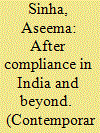

|
|
|
|
|
| Summary/Abstract |
Using India as a theory building case, this paper puts forward a theoretical framework for understanding countries’ responses to global rules and implementation effects across diverse global governance regimes and contexts. The initial premise for this paper is that the strategic structure of implementation dilemmas faced by states and actors within countries need to be understood in addition to design dilemmas. Successful global regimes must not only solve cooperation and uncertainty problems at the initial stages in choosing the right institutional matrix, but also ‘require changes in domestic institutions.’ The need to change domestic institutions creates certain implementation dilemmas. These dilemmas are a joint product of the institutional design, specific policy issue and the domestic logic of responses after international agreements have been signed. This broader idea helps understand a wide variety of India’s interactions across global governance institutions. I also suggest a novel empirical strategy of cross-institutional analysis to assess implementation dilemmas. While we have numerous cross-national studies of how compliance occurs in a wide variety of countries, we lack theory-driven, empirically grounded, comparative studies of a single country or a group of countries across diverse global regimes. Such a framework can help us better understand how countries interact with a variety of global institutions and the reciprocal effects. This framework is then used to understand India’s interactions with diverse global regimes in an illustrative manner in this article, and in greater detail by other authors in the section published in this issue of Contemporary South Asia.
|
|
|
|
|
|
|
|
|
|
|
|
|
|
|
|
| 2 |
ID:
140085
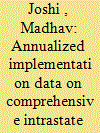

|
|
|
|
|
| Summary/Abstract |
This article introduces the Peace Accords Matrix Implementation Dataset (PAM_ID). We present time-series data on the implementation of 51 provisions in 34 comprehensive peace agreements negotiated in civil wars since 1989. We follow the implementation process for up to ten years following the signing of each agreement. The data provide new insights into the types of provisions that are more or less likely to be implemented, how implementation processes unfold over time, how implementation processes relate to one another, and how implementation affects various post-accord outcomes. We outline our coding methodology and case selection, and examine descriptive statistics. We illustrate one potential use of the data by combining eight different provisions into a composite indicator of security sector reform (SSR). A survival analysis finds that implementing security sector reforms contributes to long-term conflict reduction not only between the parties to the accord but also between the government and other non-signatory groups in the same conflict.
|
|
|
|
|
|
|
|
|
|
|
|
|
|
|
|
| 3 |
ID:
144680


|
|
|
|
|
| Summary/Abstract |
This article addresses the question of how the Israeli government and the Jewish Agency for Israel (JAFI) handled the absorption of Ethiopian immigrants in the early 1990s. It shows that, reflecting the historic rivalry between the two organizations, their interaction lacked a clear division of roles and was mired by rivalry and conflicting interests. As a result, the individual immigrant, besides dealing with predictable absorption difficulties, had to cope with bureaucratic failures.
|
|
|
|
|
|
|
|
|
|
|
|
|
|
|
|
| 4 |
ID:
166370
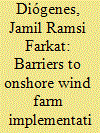

|
|
|
|
|
| Summary/Abstract |
Across the world, several developing countries with recent wind energy (WE) diffusion have been demonstrating an interest in expanding WE generation quickly and expressively. In Brazil, this fast and remarkable WE diffusion process started in the past decade, facing a variety of barriers. This research proposes to reliably identify and analyse current barriers to the implementation of onshore wind farms in the country, aiming at informing other developing countries with the intention to expand WE utilization about potential barriers, as well as assisting the Brazilian WE sector in its efforts to keep growing sustainably. To achieve this research goal, 41 key stakeholders from the Brazilian WE sector were interviewed. Based on a content analysis of the interviews, twenty-four barriers where identified, three of which with particular relevance: poor transmission infrastructure, unattractive financial loans and unstable macroeconomic environment. The data collected suggests a serious risk that Brazil's WE sector stops growing if the recovery of its national economy, the reestablishment of regular energy auctions, the access to competitive credit, and improvements to the transmission system infrastructure keep being held back. In the face of this scenario, this study concludes by providing policy recommendations concerning the sustainability of the Brazilian WE sector.
|
|
|
|
|
|
|
|
|
|
|
|
|
|
|
|
| 5 |
ID:
142598
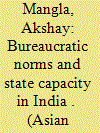

|
|
|
|
|
| Summary/Abstract |
Himachal Pradesh outperforms other Indian states in implementing universal primary education. Through comparative field research, this article finds that bureaucratic norms—unwritten rules that guide public officials—influence how well state agencies deliver services for the poor. The findings call attention to the informal, everyday practices that generate state capacity.
|
|
|
|
|
|
|
|
|
|
|
|
|
|
|
|
| 6 |
ID:
185192


|
|
|
|
|
| Summary/Abstract |
This article examines how leaders affect the implementation of peace agreements. It argues that implementation is more likely when leaders have publicly committed to peace because public commitments tie leaders’ hands, making it costly to back down from peaceful promises. This effect is hypothesized to hold even under conditions that make implementation costly: when implementing difficult provisions, when spoiler risk is high, and when implementation is unreciprocated. These expectations are tested using novel data from the IPAD dataset on the implementation of peace agreements between 1989 and 2014 and on public statements by state and rebel leaders. Results show that governments and rebel groups whose leaders have publicly committed to peace are significantly more likely to make progress toward implementation. This effect holds for difficult provisions, when spoiler risk is high, and when implementation is unreciprocated. These findings highlight the importance of leaders’ political will for successful implementation of peace agreements and sustainable peace.
|
|
|
|
|
|
|
|
|
|
|
|
|
|
|
|
| 7 |
ID:
187388
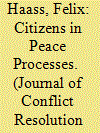

|
|
|
|
|
| Summary/Abstract |
Citizen engagement in and support for peace processes have been deemed important for sustainable peace after civil wars. Yet much of what we know about peace processes in civil wars centers on the interests of elite actors. This special feature aims to advance a research agenda focusing on citizens in peace processes to address this mismatch. In the introduction to the special feature, we first present empirical evidence situating citizens in relation to civil war peace processes. We then trace the current state of the literature on the roles of citizens in peace processes. Following that, we introduce a conceptual framework designed to improve scholarly analysis of the political behavior of citizens in peace processes. We also locate the individual contributions to the special feature within the framework in order to demonstrate its utility and as a means of helping to identify directions for future research.
|
|
|
|
|
|
|
|
|
|
|
|
|
|
|
|
| 8 |
ID:
140310
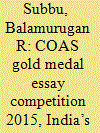

|
|
|
| 9 |
ID:
073003
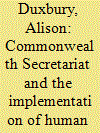

|
|
|
| 10 |
ID:
190446
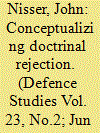

|
|
|
|
|
| Summary/Abstract |
Doctrines are considered a key component of military power, shaping the ways in which armed forces organize and operate. This study critically examines the assumption that armed forces can change their practices by writing formal doctrine. The study addresses the research problem of why some formal doctrines are implemented and others are rejected. It does so by developing and testing a novel theoretical framework on doctrinal implementation through a comparative case study on rejection of the US Army 1976 Active Defense doctrine and successful implementation of the 1982 AirLand Battle doctrine. The study shows that contrary to popular beliefs, the actual concepts within a formal doctrine do not seem crucial for whether it is implemented or rejected. Rather, cultural coherence and inclusive creation seem crucial in this regard.
|
|
|
|
|
|
|
|
|
|
|
|
|
|
|
|
| 11 |
ID:
046771


|
|
|
|
|
| Publication |
DelhI, Konark Publishers Pvt. Ltd., 2002.
|
| Description |
xii,Hbk
|
| Standard Number |
8122006329
|
|
|
|
|
|
|
|
|
|
|
|
Copies: C:2/I:0,R:0,Q:0
Circulation
| Accession# | Call# | Current Location | Status | Policy | Location |
| 045525 | 658.3/RAM 045525 | Main | On Shelf | General | |
| 045527 | 658.3/RAM 045527 | Main | On Shelf | General | |
|
|
|
|
| 12 |
ID:
122485
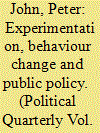

|
|
|
|
|
| Publication |
2013.
|
| Summary/Abstract |
Citizens will need to change their behaviour in pro-social ways if governments are to address current challenges in public policy. But how best to promote behaviour change? The argument in this article is that a decentralised rather than a top-down approach is particularly suitable, which can encourage innovation in the public sector and involve citizens in the implementation of policies. As a method of evaluating interventions, randomised controlled trials have a unique role to play in improving the design of policies, particularly if carried out responsively and adaptively. A culture of experimentation would value curiosity, feedback and the continual testing of interventions. The article includes three examples of experimentation: young people's political attitudes, voter turnout and donations for charity. As the popularity of 'nudge' interventions grows-shown by the success of the UK government's Behavioural Insights Team-the practice of experimentation in the public sector could become the norm.
|
|
|
|
|
|
|
|
|
|
|
|
|
|
|
|
| 13 |
ID:
187555
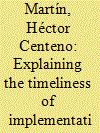

|
|
|
|
|
| Summary/Abstract |
Truth commissions are widely seen as important peacebuilding tools partially because they issue recommendations that seek to prompt further justice initiatives to address past abuses and promote institutional reforms that encourage non-repetition. Yet, despite growing interest in truth commissions among academics, policymakers, and activists, little attention has been paid to the recommendations that they outline in their final reports. In this article, we examine the factors that shape whether and when truth commission recommendations are enacted. Thus, we seek to explain not only whether recommendations are implemented, but also how quickly they are implemented. We use survival analysis to test the effects of a range of political and economic country-level variables, commission-specific qualities, and recommendation characteristics on the implementation record of nearly 700 recommendations formulated by ten Latin American truth commissions that operated between 1984 and 2014. The analysis yields interesting results, including that implementation proceeds more quickly in wealthier countries and when recommendations are issued by commissions created immediately after transitions, when the transitions occurred in which one side was victorious, and when commissions are created by an executive order. Moreover, recommendations that are directed towards the past are implemented more slowly than future-oriented measures.
|
|
|
|
|
|
|
|
|
|
|
|
|
|
|
|
| 14 |
ID:
137633
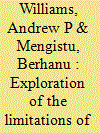

|
|
|
|
|
| Summary/Abstract |
This article seeks to unpack the implications of contemporary peacebuilding for technocratic, bureaucratic organizational forms. It argues that if the contemporary peacebuilding literature is taken as given, fundamental alterations are required in predominately Western peacebuilding systems—specifically in the structure and function of bureaucratic organizations that typically fund, manage and execute peacebuilding interventions. The analysis proceeds by matching five ‘peacebuilding principles’ derived from contemporary literature, with an organizational framework that highlights key structural and functional aspects of bureaucracies, thus allowing organizational deficiencies to be identified. The article argues that current peacebuilding scholarship would benefit from theoretically guided organizational research on the various organizations and systems involved in peacebuilding implementation. It concludes that peacebuilding scholars can be informed by the significant body of knowledge in the fields of public administration and policy, which bring a rich history of studying implementation situations that parallel in many ways complex peacebuilding interventions.
|
|
|
|
|
|
|
|
|
|
|
|
|
|
|
|
| 15 |
ID:
184112


|
|
|
|
|
| Summary/Abstract |
Export controls of dual-use products and sanctions on respective items are highly regulated in the European Union (EU). However, we find multiple instances of implementation and application problems of dual-use control in the Member States. To explain this puzzling observation, we investigate the relationship between the institutional design of sanctions and their subsequent implementation and application. Drawing on rational design theory, we argue that even if coherence is the EU’s stated goal, the institutional design of the current dual-use export control regime is inadequate to provide for coherence. National licensing decisions and a constant need for the interpretation of contingent rules in the implementation and application of dual-use sanctions are structural challenges to establish a coherent European policy. The relationship between institutional design and coherence, which we investigate in the context of sanctions, is not specific to the EU. Instead, we offer a novel conceptual and analytical tool to study the expected degree and causes of (in-)coherence in the implementation and application of any regime of international sanctions.
|
|
|
|
|
|
|
|
|
|
|
|
|
|
|
|
| 16 |
ID:
155671
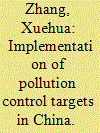

|
|
|
|
|
| Summary/Abstract |
The scholarly work on China's environmental regulations in the context of “central–local” relations is dominated by the preference for a centralized approach. This article examines a centrally imposed and executed verification programme of locally reported pollution data, a rare and sustained central effort to enforce an environmental policy, namely the national pollution reduction target system. The programme was established in 2007 to curtail perceived widespread data falsification and to enhance the quality of emission data, the basis for assessing local compliance with targets. Based on an analysis of official documents and interviews with environmental officials and industry representatives, this article found that the verification programme appears to have reduced the overreporting problem with emission data, enhanced local monitoring and enforcement capacity, and to a certain degree deterred violations due to the increased frequency of national and local inspections. Nevertheless, significant challenges remain. Verification is highly resource intensive, it has involved little external oversight and public participation, the central authority has exerted significant yet unchecked discretionary powers, and poor data quality has remained an issue. Over time, the verification programme appears to have turned into essentially a “numbers game.” All those challenges indicate that a centralized enforcement approach is arguably ineffective in addressing China's long-standing problem of weak environmental policy implementation. This study also sheds lights on the classical “principal-agent” theory in the study of public bureaucracy. Not only does the principal distrust the agent, which is the main concern of the theory, but the agent also distrusts the principal.
|
|
|
|
|
|
|
|
|
|
|
|
|
|
|
|
| 17 |
ID:
088186


|
|
|
|
|
| Publication |
2008-09.
|
| Summary/Abstract |
One of the most important lessons we have learned from the 60-year Palestinian-Israeli conflict is that the essence of the struggle has not changed: It is the expulsion of the people of Palestine from their homes and the confiscation of their land. Since then the Palestinian refugees have been dispersed all over the world, many of them living in deplorable conditions in exile, others suffering under occupation or virtual siege, harassed by friend and foe alike. The implementation of their inalienable rights is the key to a permanent peace. All else, including a Palestinian state, so-called regional cooperation or other contrived devices to obscure this fundamental issue, is peripheral. In addition, the misrepresentation of the Right of Return by Israel and its defenders, the United States in particular, is driven more by fear about, rather than interest in, their rights. However, the refugees issue is still the main problem to contend with and is imposing itself on every agenda of negotiating the question of Palestine.1 This article will propose a practical and reasonable solution for the refugees to exercise their right to return to their homes.
|
|
|
|
|
|
|
|
|
|
|
|
|
|
|
|
| 18 |
ID:
173739
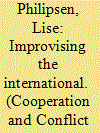

|
|
|
|
|
| Summary/Abstract |
In this article, I argue that the introduction of ethnography to International Relations has not taken full advantage of the potential of bringing these two fields together. Using international intervention as an example, I suggest that to bring out this potential we need to be more attentive to the classical virtues of ethnography. This means taking the subjects of our studies much more seriously, as people capable of making sense of and reacting to the structures of power they are embedded in. Here implementers tasked to put international policies into action in relation to a concrete context provide an overlooked source of knowledge. Using their experiences, reflections and ways of dealing with the concrete dilemmas that arise in their daily work enables us to analyse intervention as concrete relations of power that play out, affect and are mitigated by people in the field. Seeing knowledge as in this manner arising from the field provides a deeper knowledge that is necessary if we want to read intervention not only as an exertion of power from the international to the local, but as dynamically reshaped, resisted and made sense of in the field.
|
|
|
|
|
|
|
|
|
|
|
|
|
|
|
|
| 19 |
ID:
136075


|
|
|
|
|
| Summary/Abstract |
A critical element in implementing a compensation scheme including nonmonetary incentives (NMIs) is recognizing that preferences vary widely across Service members. There are at least three sources of variability: across different population classes, across individuals within a population class, and across NMI packages for a particular individual. Surveys across different military communities, ranks, and years of Service show the difficulty of identifying any NMI that has significant value for even 50% of the active duty force. At the same time, approximately 80% of the surveyed Service members expressed a significant positive value for at least one NMI. Therefore, one-size-fits-all incentive packages will not be nearly as effective as more personalized incentive packages. The authors discuss variability in Service member NMI preferences and outline an approach to implementing personalized NMI packages in military compensation through a sealed-bid reverse auction, where Service members select individual NMIs from a “cafeteria-style” menu of options.
|
|
|
|
|
|
|
|
|
|
|
|
|
|
|
|
| 20 |
ID:
099819


|
|
|
|
|
| Publication |
2010.
|
| Summary/Abstract |
A key aspect of the negotiations for the 2001 Stockholm Convention on Persistent Organic Pollutants (POPs) related to provisions surrounding its financial mechanism to facilitate its implementation in developing countries. This article examines how financial aspects of the Convention were negotiated as the treaty was taking shape and how financial provisions have been implemented since the Convention's entry into force in 2004. Regarding the design of the financial mechanism, developing countries stressed the need for new and additional financial resources and a tailored institution, while developed countries favored working with existing financial institutions, notably the Global Environment Facility (GEF). In the end, countries compromised by agreeing that GEF would serve as the Convention's "interim" financial mechanism while also recognizing that financial and technical support is directly related to developing countries' ability to comply with the treaty's obligations. We discuss the implications of this outcome and then provide an overview of how this arrangement has played out in practice. We conclude by discussing the implications of recent developments, notably the expansion of the scope of the Convention from 12 to 21 chemicals in May 2009 and the finalization of the fifth replenishment of the GEF in May 2010.
|
|
|
|
|
|
|
|
|
|
|
|
|
|
|
|
|
|
|
|
|